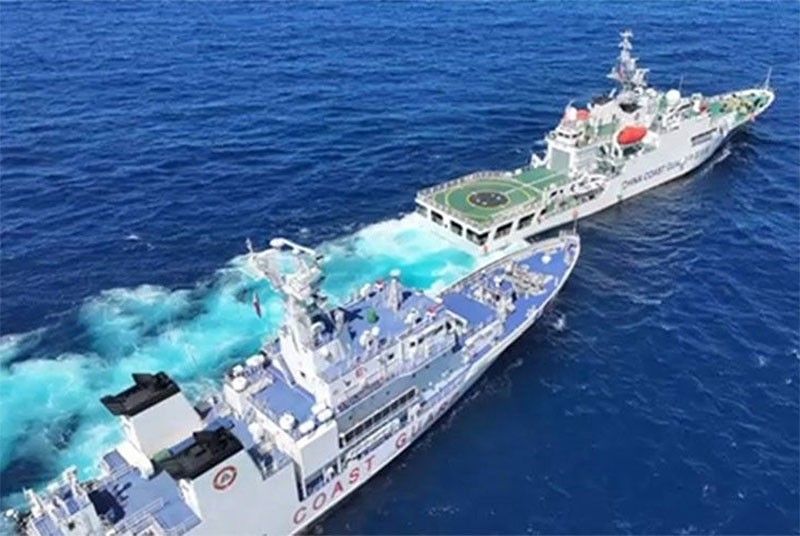‘Exposing China’s bad behavior won’t lead to war’

MANILA, Philippines — It is “illogical” and “preposterous” to conclude that exposing China’s bad behavior in the West Philippine Sea would lead to World War III, Commodore Jay Tarriela of the Philippine Coast Guard (PCG) said yesterday.
Tarriela, who is also PCG spokesman on the West Philippine Sea, was reacting to a video posted on X (formerly Twitter) by the Beijing-run English newspaper Global Times showing an executive of a pro-China think-tank claiming that the United States’ provocation of the Philippines against China could lead to world war.
“A third country like the United States come into the picture and push and push the Philippines to provoke China. For that matter, a Third World War is possible,” Anna Malindog-Uy, vice president for external affairs of the Asian Century Philippines Strategic Studies Institute, said in the Global Times report posted on X.
But Tarriela disagreed.
“It is illogical to argue that the Philippines’ policy of exposing China’s bad behavior at sea would lead to a ‘Third World War,’ ” the PCG official said on X. “It is a preposterous claim lacking empirics.”
“Exposing China’s aggressive behavior, illegal presence and bullying tactics in the West Philippine Sea is aimed at supporting the Philippines’ principled position – that disputes must be resolved through peaceful means in accordance with international law,” Tarriela pointed out.
He added that the Philippines, like other countries, is committed to maintaining peace and stability in the region.
China, for its part, should “abide by international law and refrain from altering the status quo by coercion and intimidation,” he said.
He also clarified that contrary to what Uy was saying in the Global Times report, the Philippines is not being pressured to expose China’s coercion and blatant violation of international law.
The Philippines, he added, is only fighting for its sovereign rights.
“Any nation worthy of its name will resist when its sovereignty and sovereign rights are being taken away. The fact is inconvertible,” he stressed.
“Likewise, China does not need any ‘push’ to blatantly violate international law. It has been their strategy from the very beginning to change the status quo by coercion and erode the established rules-based order,” he added.
Supply runs
As this developed, the Armed Forces of the Philippines (AFP) said it is preparing to launch more supply runs to the West Philippine Sea to support Filipino troops and fishermen.
AFP spokesperson Col. Francel Margareth Padilla said rotation and resupply operations or RORE are set for this month for the Rizal Reef and Likas stations and for Pagasa Island, Kota, Panata and Parola in the first week of April.
The announcement came a week after the Chinese again tried to prevent Filipino vessels from reaching the BRP Sierra Madre in Ayungin Shoal to unload supplies and provisions for Filipino troops stationed on the beached World War II era transport ship.
The Chinese used water cannons and made dangerous maneuver to drive away the Filipino boats.
“The AFP will continue its rotation and re-provision or the RORE missions in other islands and features in the WPS,” she told reporters yesterday.
She also reported the presence of Chinese vessels in Philippine waters – five China Coast Guard (CCG) ships, 18 maritime militia vessels and 10 smaller boats around Panatag Shoal.
One CCG ship and six fishing vessels were spotted in the vicinity of Ayungin Shoal while one CCG ship and six fishing vessels were also sighted around Pagasa Island, she said. Seven Chinese fishing vessels were sighted in Panata Island.
The Philippine Navy said it expects the Chinese to continue harassing Filipino resupply vessels, but its spokesman for the WPS, Commodore Roy Vincent Trinidad, said the Ayungin incident on March 5 was not as intense as what happened in 1993 and 1994.
“In 1993-1994 in Mischief (Panganiban) Reef, it was gray on gray,” he explained, referring to the term used for naval ships.
“When China first occupied Mischief Reef, before they put up the fishermen shelters, before they had a reclamation, they stationed Navy ships inside Mischief Reef and they barred our ships from going in. There were a couple of standoffs in 1993-1994 between (Philippine) Navy ships and PLA (People’s Liberation Army) Navy ships. That was intense,” he said.
He described last week’s incident as “normal water cannon incidents,” except that they caused injuries – although minor – and caused slight damage to Filipino boats.
He emphasized the Chinese actions on March 5 were illegal, unprofessional and uncalled for.
Trinidad said recent developments have “minimal” impact on the overall security situation, as such incidents have become “the new normal, the new operating environment” that the military has to deal with.
Unacceptable
Meanwhile, the Department of Foreign Affairs (DFA) said it took seriously confidential bilateral discussions with Beijing, which the latter had made public, but found several points unacceptable.
In one of the points raised, the DFA said China “insisted on actions that would be deemed as acquiescence or recognition of China’s control and administration over Ayungin Shoal as China’s territory.”
“As Ayungin Shoal is a part of the exclusive economic zone of the Philippines, the proposal of China could not be considered by the Philippines without violating the Philippine Constitution or international law,” the DFA said in a statement.
“It should be noted that any agreement or understanding to be reached with any foreign government should not only be in accordance with our mutual interests, but should also not undermine the Philippine Constitution or denigrate the legally-settled rights of the Philippines under international law, particularly the 1982 UNCLOS and the 2016 Arbitral Award,” the DFA said.
The same proposal was raised by Chinese vice foreign minister Sun Weidong in March 2023, which the official called “gentleman’s agreement.”
“From the outset, the DFA wishes to underscore that the Philippines is approaching these confidential negotiations with utmost sincerity and good faith. We were, therefore, surprised by China’s disclosure of sensitive details of our bilateral discussions,” the DFA said.
The DFA said it received last year a number of concept papers from China on various maritime-related proposals.
“In no way did the Philippine government ignore China’s proposals,” the department said.
It said that upon receipt of the Chinese proposals, the Philippine government immediately undertook serious study and consideration of all of them.
The DFA said it had lengthy and in-depth consultations with various concerned agencies with primary competence or functional mandate over the topics and issues raised in the Chinese concept papers.
Several rounds of internal discussions and deliberations were also undertaken within the DFA to consider the Chinese proposals.
“While a few proposals were deemed somewhat workable, many of the remaining Chinese proposals were determined, after careful study, scrutiny and deliberation within the Philippine government, to be contrary to our national interests,” the DFA said.
Instead of considering the counter-proposals submitted by the Philippines, China presented its own counter-proposals, which again “did not reflect our interests, especially on issues such as the South China Sea,” according to the DFA. – Michael Punongbayan, Pia Lee-Brago
- Latest
- Trending


































